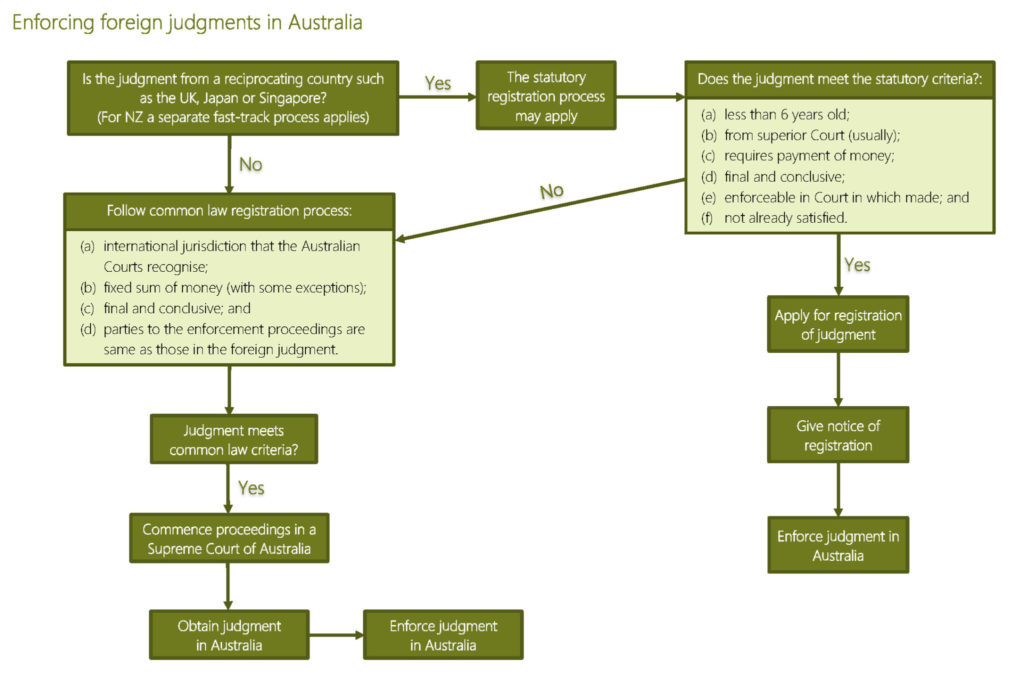Enforcing foreign judgments in Australia
There are two ways of enforcing foreign judgments in Australia: under a statutory scheme and under common law principles. The statutory regime is more straight-forward and cost effective.
Countries to which the statutory scheme applies
The Foreign Judgments Act 1991 (Cth) provides a statutory scheme for the recognition and enforcement of foreign judgments in Australia.
The statutory scheme only applies to specific countries that have entered into reciprocal arrangements with Australia, including the UK, Japan, Singapore, Korea, Italy, Germany, and France.
The statutory scheme does not apply to the enforcement of judgments obtained in China, India or the US.
A separate regime for the enforcement of New Zealand judgments in Australia has recently been introduced, which makes enforcement of New Zealand judgments even easier. Registration and enforcement of non-money judgments of New Zealand Courts is possible and even some penal judgments can be enforced in Australia (click here to learn more) .
Judgment criteria (except New Zealand)
To be enforceable under Australia’s statutory scheme, the judgment must:
(a) be less than six years old;
(b) typically be from a superior Court of a specified foreign country (although in some instances it may be from an inferior Court) with which Australia has a reciprocal registration agreement;
(c) require the payment of money;
(d) be final and conclusive (if the judgment is subject to an appeal it can still be final and conclusive, although the registration process may be stayed by an Australian Court if the judgment debtor has appealed the debt or indicates an intention to appeal);
(e) be enforceable in the Court in which it was made; and
(f) not have already been satisfied in the foreign jurisdiction.
Arbitral awards
A foreign arbitral award that has become enforceable in a foreign jurisdiction can also be enforced under the statutory scheme.
Registering the judgment
Registering a judgment in Australia under the statutory scheme is straightforward.
An application is filed in the Supreme Court of a State of Australia. Registration applications are typically made on an ex parte basis (i.e. in the absence of another party).
In most cases the application will be dealt with by a judicial officer on the papers without appearance in Court. If the judgment meets the formal requirements prescribed in the Foreign Judgments Act 1991 (Cth), the Australian Court must register it. Costs incidental to registration of the judgment can be sought, as can post-judgment interest.
The judgment debtor must be served with notice of the registration once the judgment has been registered.
Enforcing a registered judgment
Once registered, the judgment effectively has the same status as a judgment delivered by an Australian Court. The enforcement procedures available under Australian law include issuing a statutory demand against a company or issuing a bankruptcy notice against an individual.

Recognition of a foreign judgment pursuant to the common law
If the statutory scheme is not available, a plaintiff can enforce a foreign judgment in Australia under the common law.
Judgment criteria
To be enforceable under common law principles the foreign judgment must:
(a) have been delivered by a foreign Court with an international jurisdiction that the Australian Courts recognise (usually if the defendant was personally served with the originating process whilst resident or present in the jurisdiction of the adjudicating Court or the defendant voluntarily submitted to the jurisdiction of the adjudicating Court, this will be satisfied);
(b) be for a fixed sum of money (with some exceptions); and
(c) be final and conclusive.
Enforcing the foreign judgment
If the judgment meets the above criteria the party with the benefit of the judgment is usually entitled to enforcement of the foreign judgment in Australia. Defences are limited. It is not open to the defendant to challenge the intrinsic merits of the foreign decision. The main defences that a defendant can raise to challenge a foreign judgment are on the basis that it was obtained by fraud or is contrary to Australian public policy.
A plaintiff will need to commence proceedings in an Australian Court, either by way of new proceedings based on the original cause of action (relying on the foreign judgment to stop the judgment debtor from raising a defence which was not raised in the foreign proceedings), or by relying on the foreign judgment creating a debt. The parties to the recognition proceedings must be the same as those in the foreign judgment.
This publication covers legal and technical issues in a general way. It is not designed to express opinions on specific cases. It is intended for information purposes only and should not be regarded as legal advice. Further advice should be obtained before taking action on any issue dealt with in this publication.



